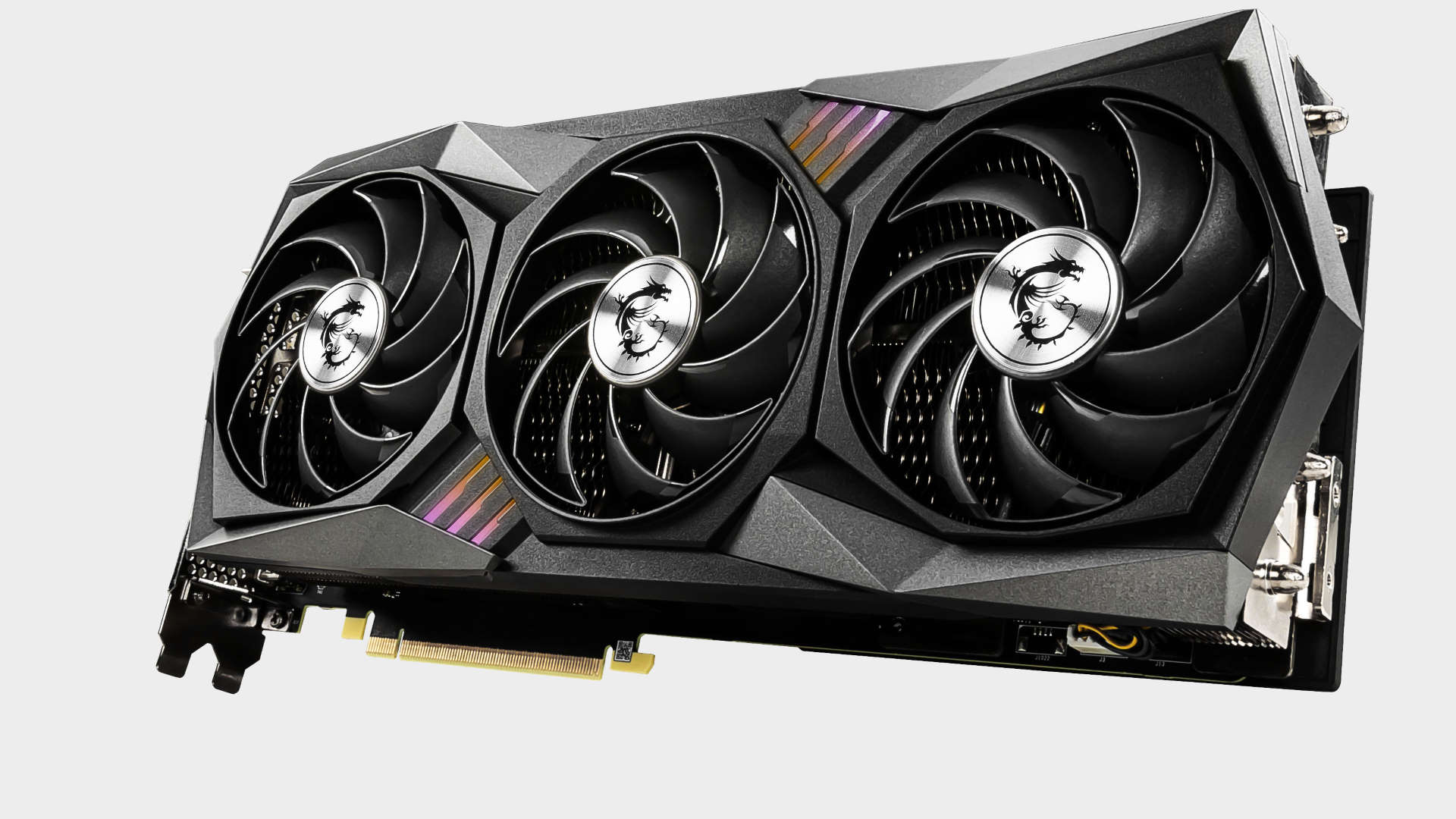Our Verdict
MSI's RTX 3080 Gaming X Trio is cooler, quieter and faster than the Founders Edition. This one is a genuine contender.
PC Gamer's got your back
The beefy MSI RTX 3080 Gaming X Trio is here, though the dust has hardly settled on the launch of the Nvidia RTX 3080 and Nvidia RTX 3090.. and there’s still so much more to come from both Nvidia and rivals AMD. While the launch of the RTX 3080 hasn’t been a smooth one, with teething troubles in the form of nonexistent stock and some likely fleeting hardware and/or software and/or firmware issues, we come back to the fact that the RTX 3080 is an absolute beast of a GPU that offers awesome value vs. the 2080 Ti.
We had a deep dive look at the Founders Edition, and we were left amazed at the generation-on-generation performance uplift on top of its surprising thermal performance and low noise characteristics. However, there’s always room for improvement and that’s what we expect to see from the top-tier partner cards, including the likes of the Asus Strix, Gigabyte’s Aorus and MSI’s Gaming cards. We generally expect third party cards to be faster, cooler, and quieter.
But does the MSI Gaming X Trio have what it takes to clear the high bar set by the Founders Edition?
The MSI GeForce RTX 3080 Gaming X Trio 10G is every bit a premium tier card thanks to its custom PCB design and particularly its highly regarded TriFrozr cooler. It’s a big triple slot card. It’s got tasteful splash of RGB lighting you can control with MSI’s Mystic Light app. Oh, and the backplate is supposedly infused with graphene. Yes, wonder-material graphene.
GPU - GA102
CUDA cores - 8,704
Base clock - 1,440MHz
Boost clock - 1,815MHz
Memory - 10GB GDDR6X
Memory speed - 19Gbps
Outputs - 1x HDMI 2.1, 3x DP 1.4a
Power connectors - 3x 8pin
TDP - 340W
Price - $760 | £780
MSI claims that it improves rigidity while improving the card's heat dissipation capability. Twisting and wrenching tests aren’t a standard part of our benchmark suite, so we’ll have to take MSI’s word for it.
Outputs consist of the standard set of three V1.4a DisplayPort connections and a single HDMI 2.1 port. Perhaps a second HDMI port would have been welcome.
The card makes use of triple 8-pin power connectors that deliver power to a 13 phase VRM with an additional 3 phases for the 10GB of 19 Gbps Micron memory. The PCB is almost sparsely populated, but then it is much larger than the unusually shaped Founders Edition PCB, so that's not really a surprise.
The rated boost clock of the Gaming X Trio is 1,815 MHz, but as we saw with the Turing cards, this number is almost meaningless as the card will consistently clock higher than this. That 1,815 MHz is 105 MHz on top of the Founders Edition, which isn’t a huge jump, but it’s enough to make a difference in the benchmarks.
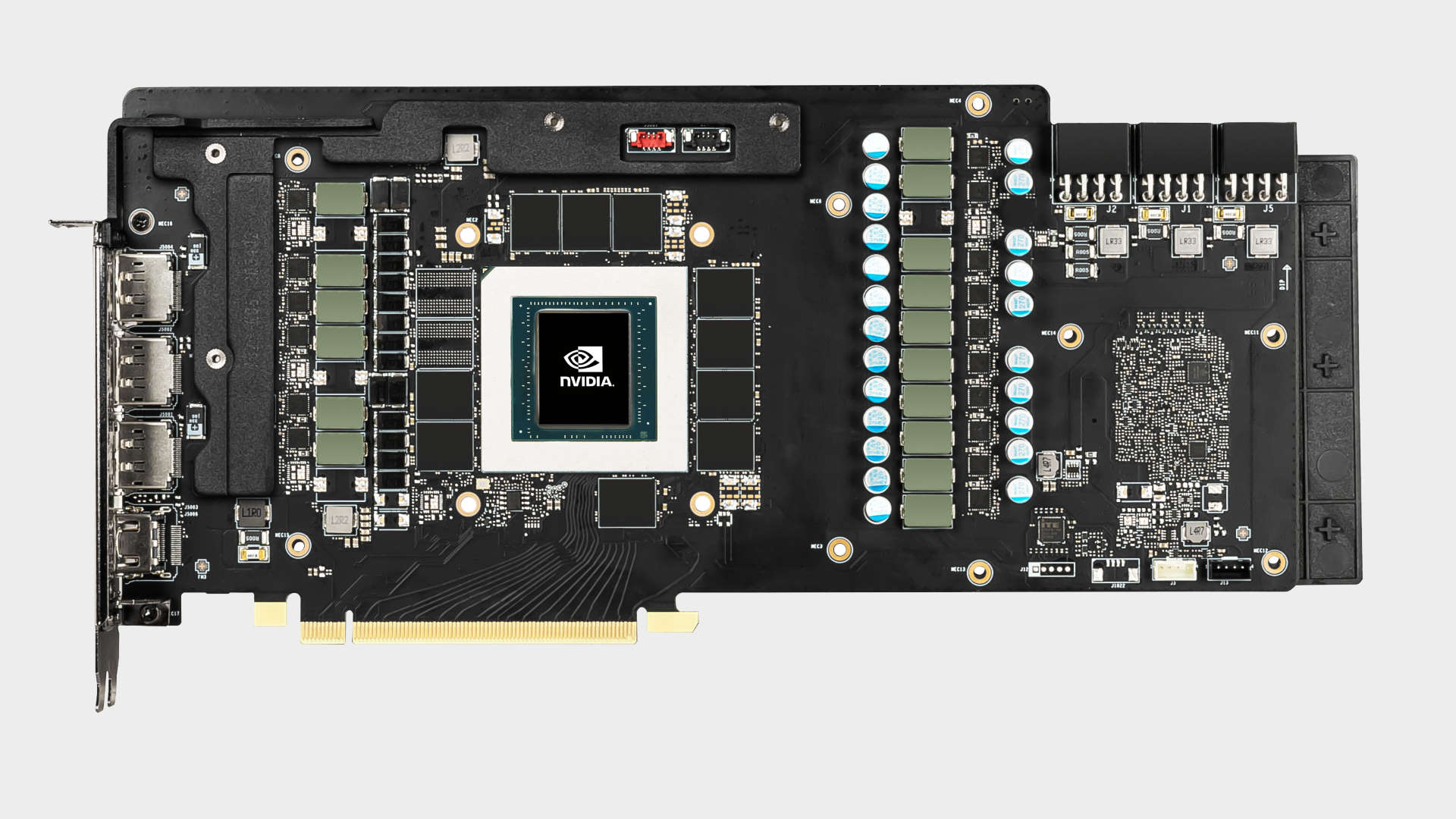
MSI rarely makes a misstep when it comes to its cooler
On a related note, MSI says all of its retail and review sample 3080 Gaming X Trio cards feature an updated CAP implementation, so this should not be causing the crashing problems that are afflicting many RTX 3080’s and RTX 3090’s. The original photography that went around was supposedly based on engineering samples which were never mass produced. Our sample was sent to us pre-release and throughout our testing we've had precisely zero crashes. Well done MSI for getting out ahead of this issue.
The MSI RTX 3080 Gaming X Trio’s true strength lies with its chunky cooler. The TriFrozr knocks it out of the park. It’s got some nice touches like space-age fans, and fins with fancy marketing names, but it’s the end result that matters. It hits the trifecta of being cooler and quieter than the Founders Edition, while delivering higher boost clocks and hence better performance.
During our testing, the chip-chiller couldn’t be heard over the sound of our NZXT AIO cooler. If you crank it up all the way, of course it’s loud, but at no stage did we observe or even get a hint that the cooler was being genuinely stressed.
MSI rarely makes a misstep when it comes to its cooler implementations and the 3080 Gaming X continues this trend.
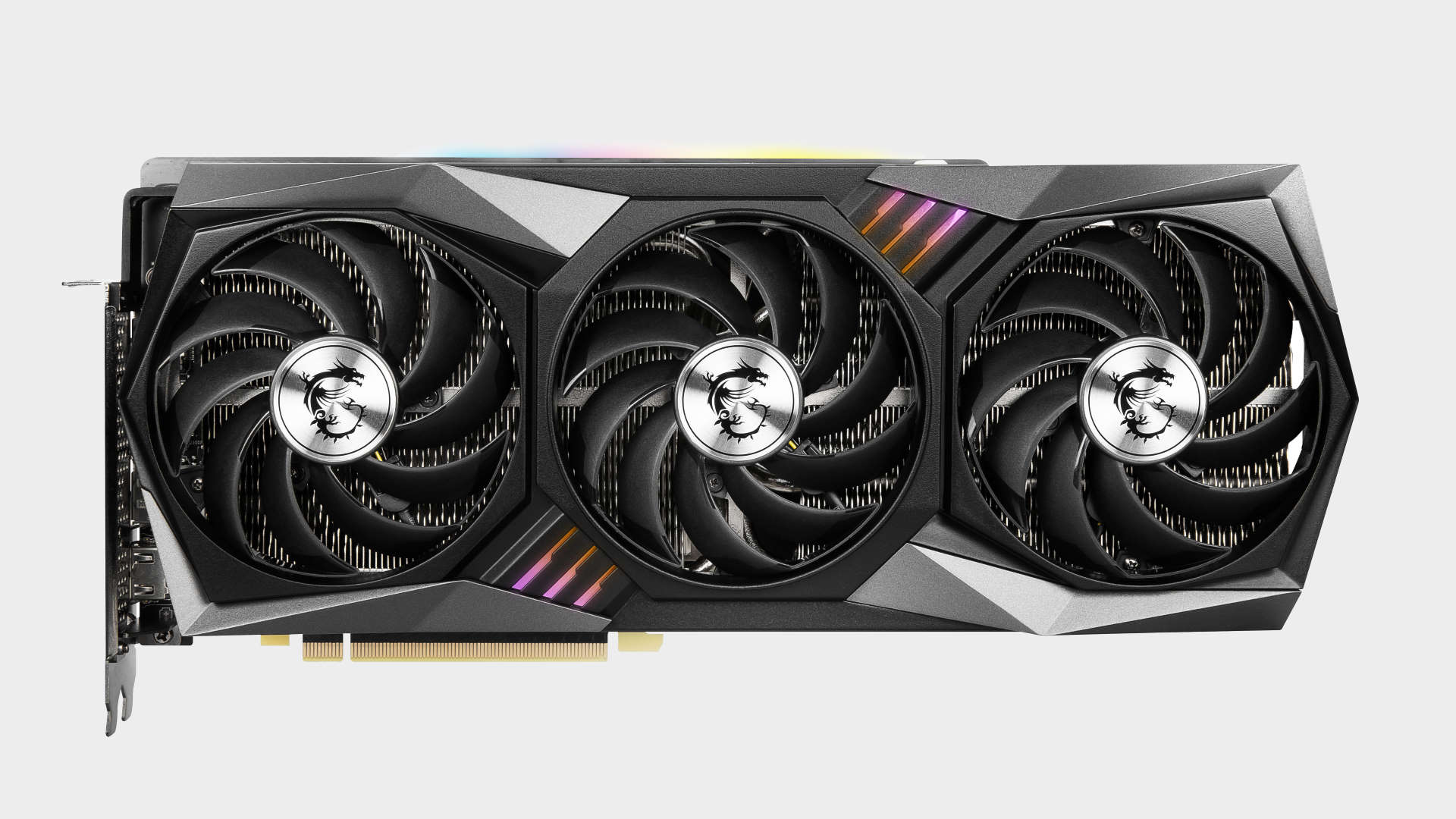
MSI RTX 3080 Gaming X Trio benchmarks
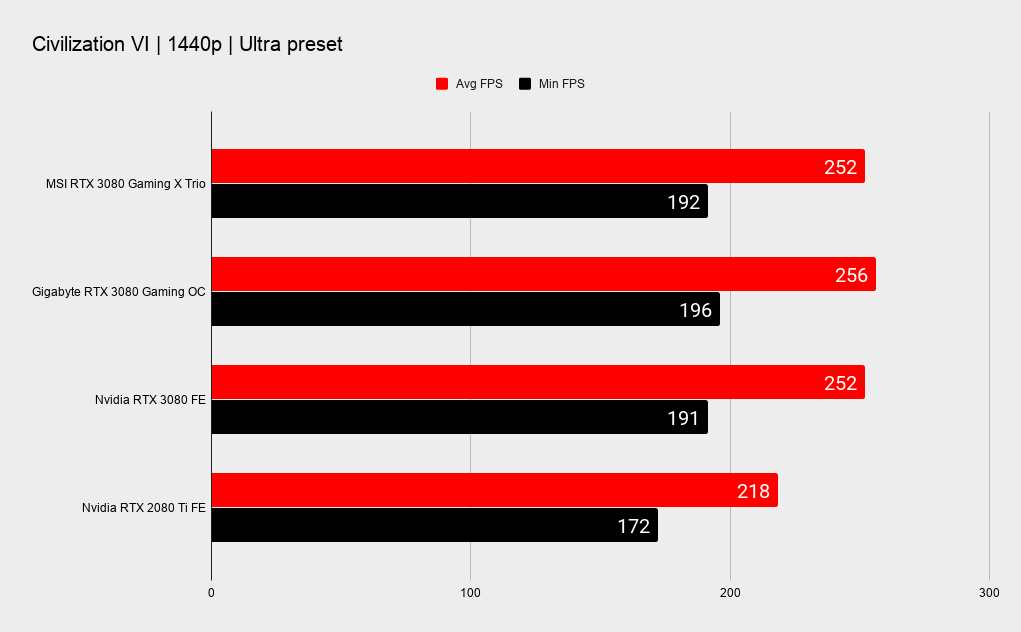
1440p performance
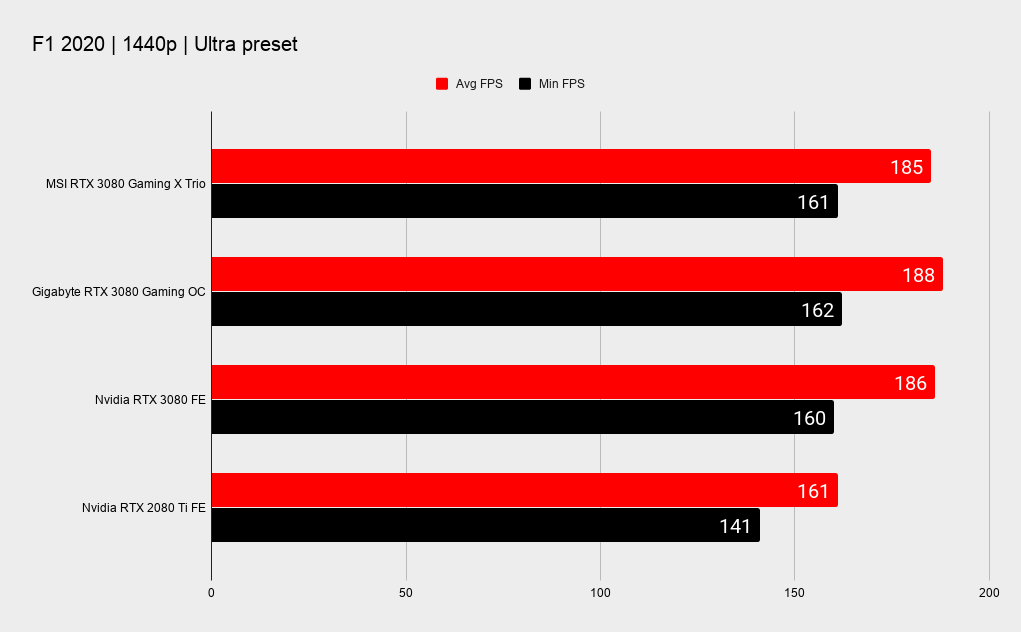
1440p performance
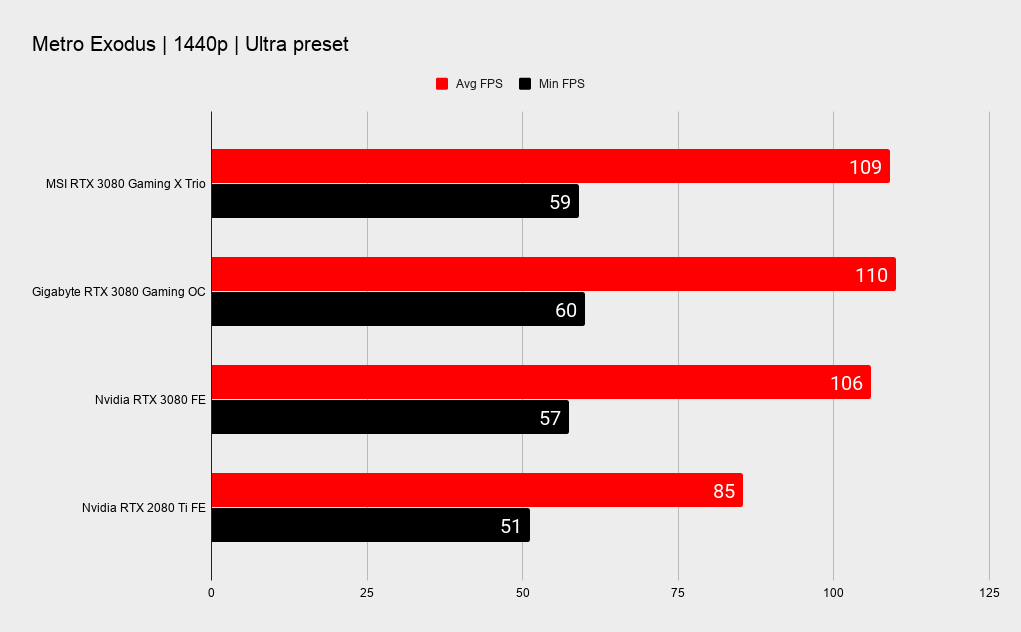
1440p performance
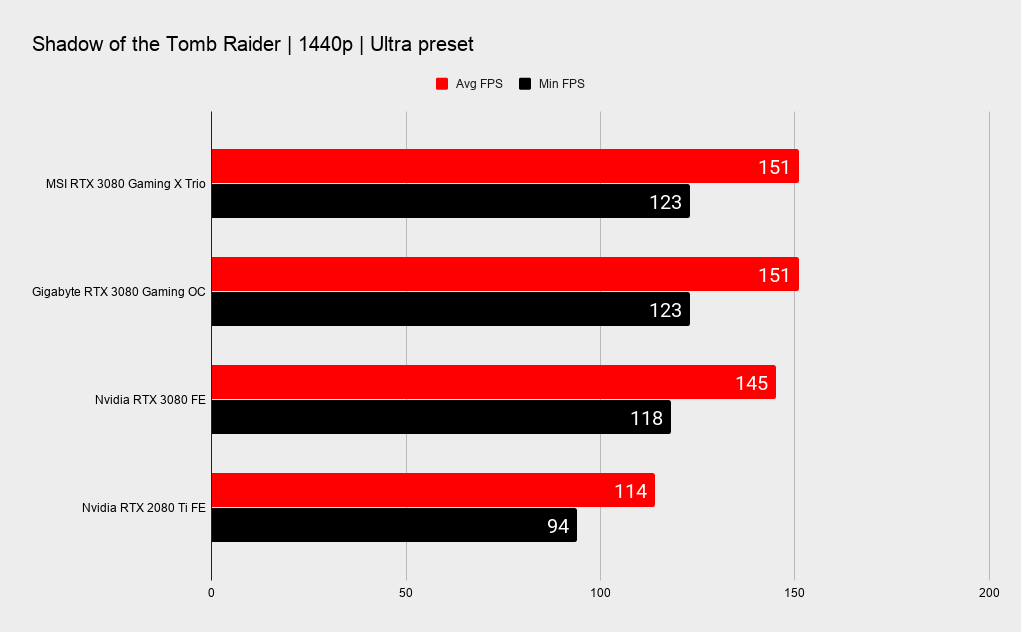
1440p performance
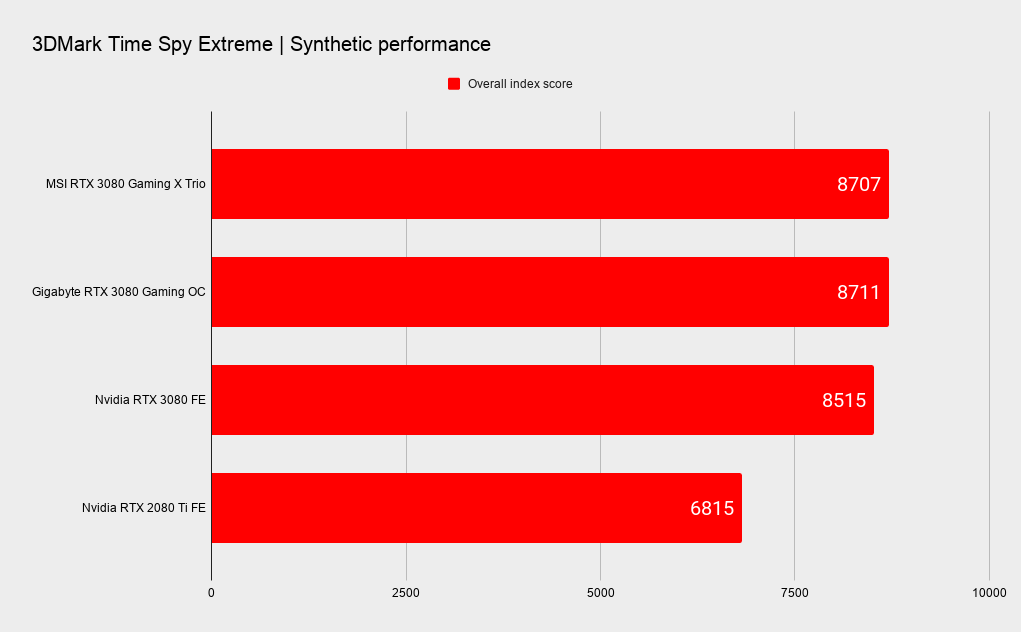
4K performance
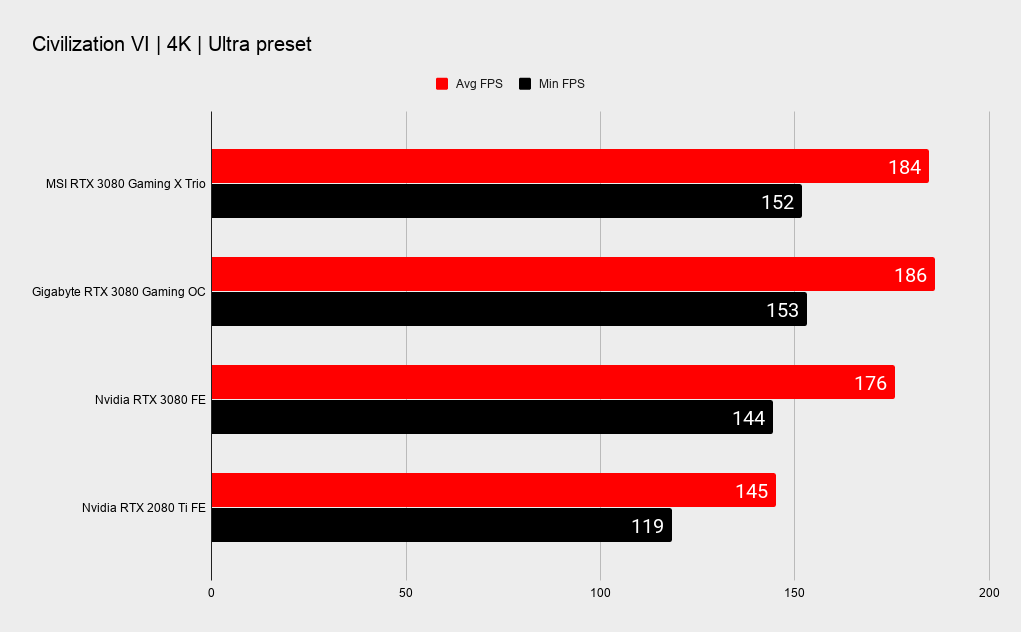
4K performance
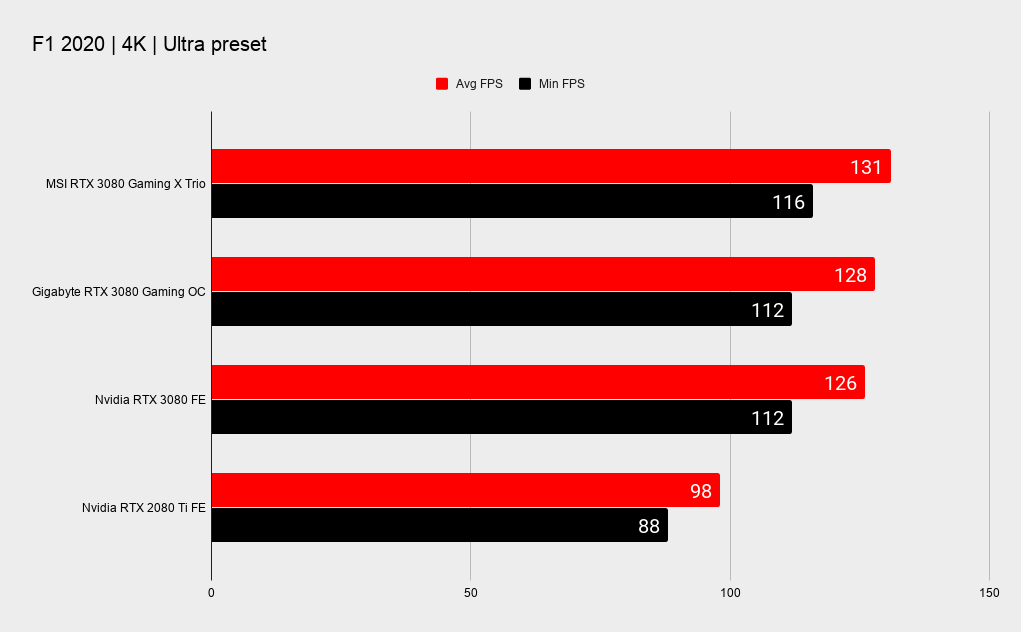
4K performance
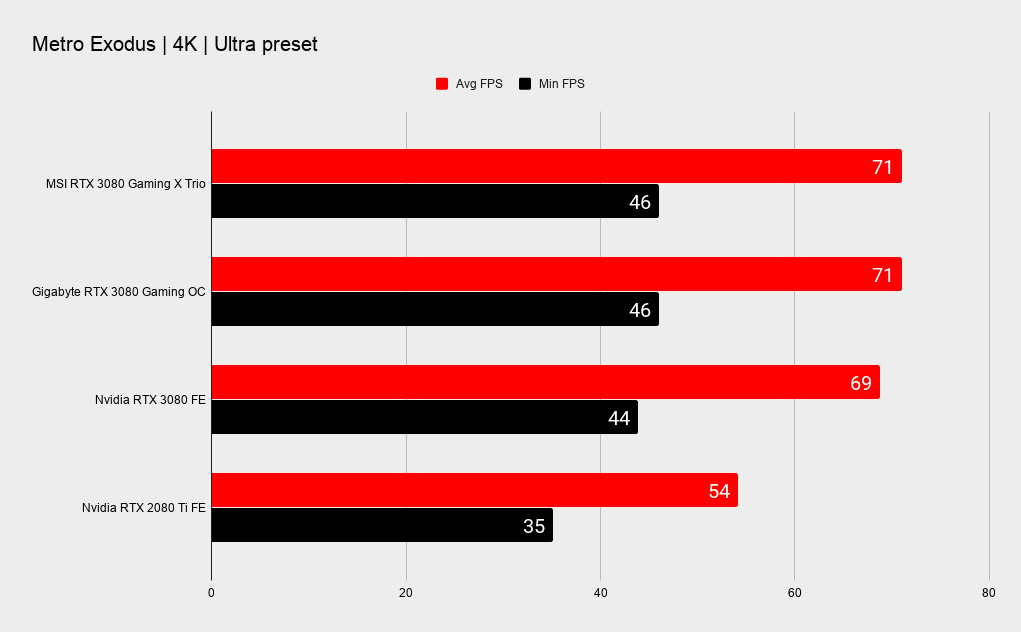
4K performance
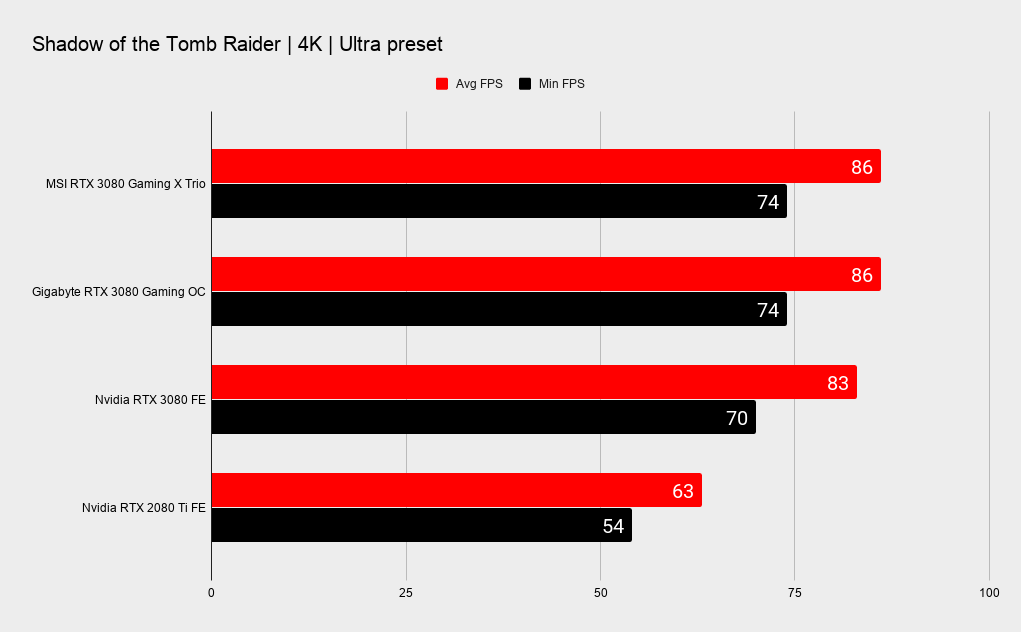
4K performance
When it comes to performance, the Gaming X is faster than the Founders Edition, by a reasonable, if not earth shattering amount. Of the cards I've has tested so far, the Gigabyte Gaming OC has a slight advantage thanks to its slightly higher average boost clocks. The Gigabyte is the louder of the two though. If you're running at 4K, 200 Hz+, or you have a few ultrawides sitting around going nothing, you'll love the grunt on offer.
Nvidia’s Turbo boosting mode is directly influenced by temperature levels, so the cooler needs to perform in an appropriate window where noise levels are kept in check while giving the card enough cooling capability to allow the GPU to maintain high boost clocks. The MSI sits in this sweet spot. Under a long duration 100% load, the highest temperature we saw was just 69°C. This allowed the card to consistently boost to levels around 1,950 MHz to 1,985 MHz.
Crucially there weren’t any wild jumps that are speculated to contribute to the well-publicized instability issues affecting some cards.
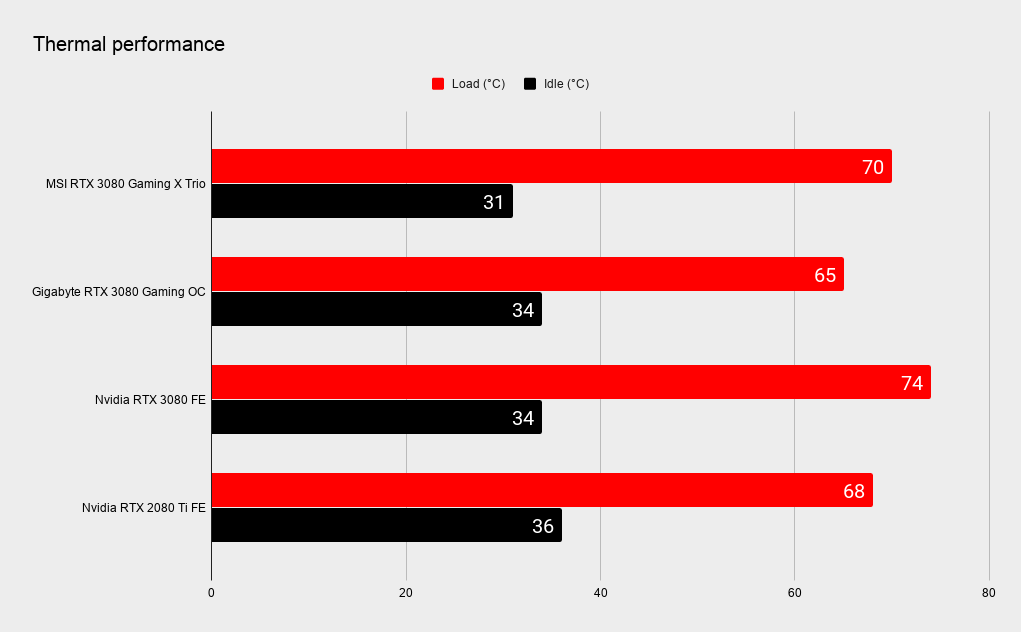
We had a brief go at overclocking but it seems power limitations come into effect very quickly as even a 50 MHz increase was flaky. We wouldn’t bother overclocking a 3080 at least until the likes of MSI’s Lightning or EVGA Kingpin come along to show us what the GA102 GPU is truly capable of.
The MSI RTX 3080 Gaming X Trio is terrific example of a quality RTX 3080 card. It’s cool and quiet, it powers through any game at 4K, it looks good and it’s built like a brick outhouse. That is if you can actually buy one.
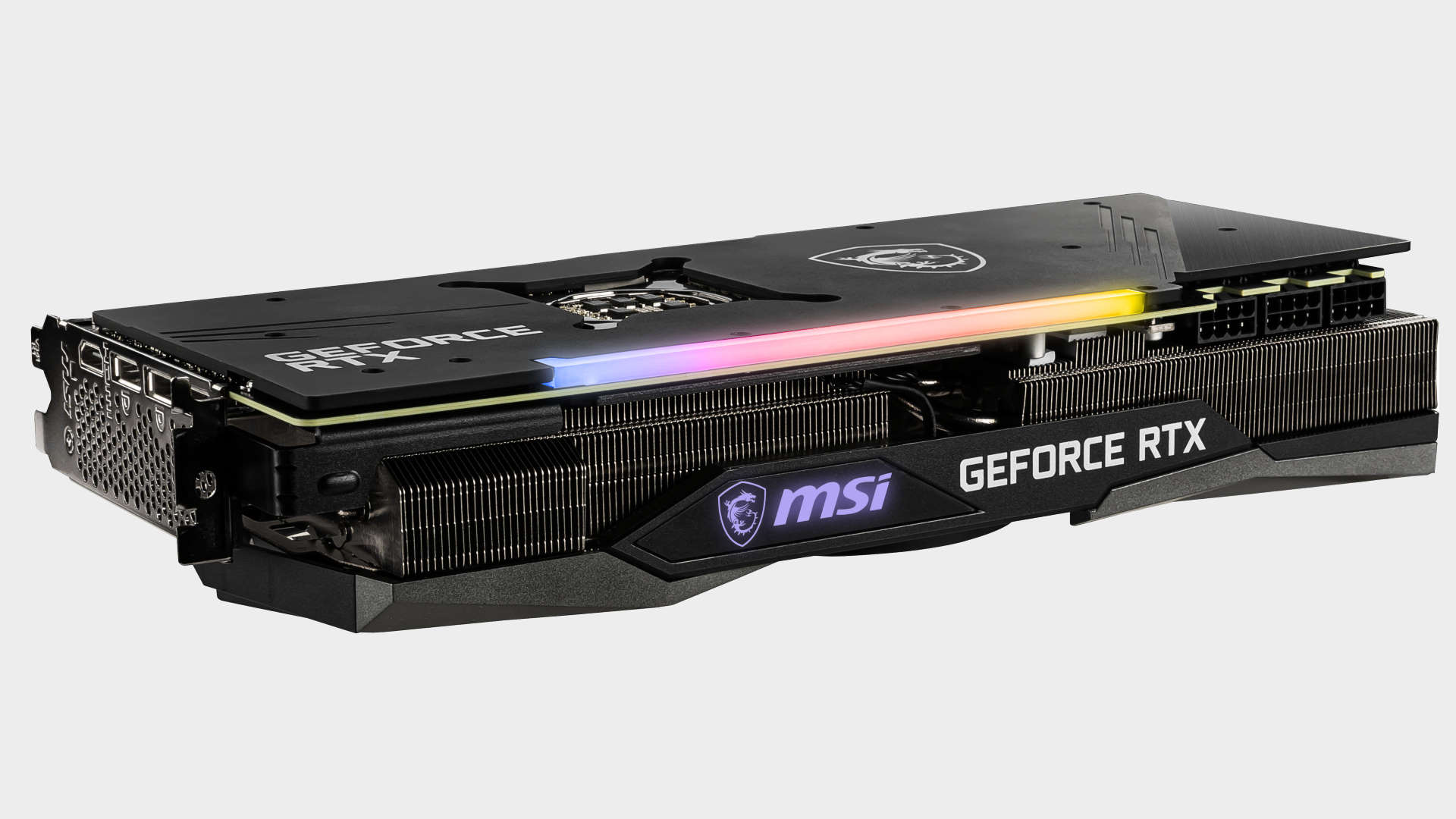
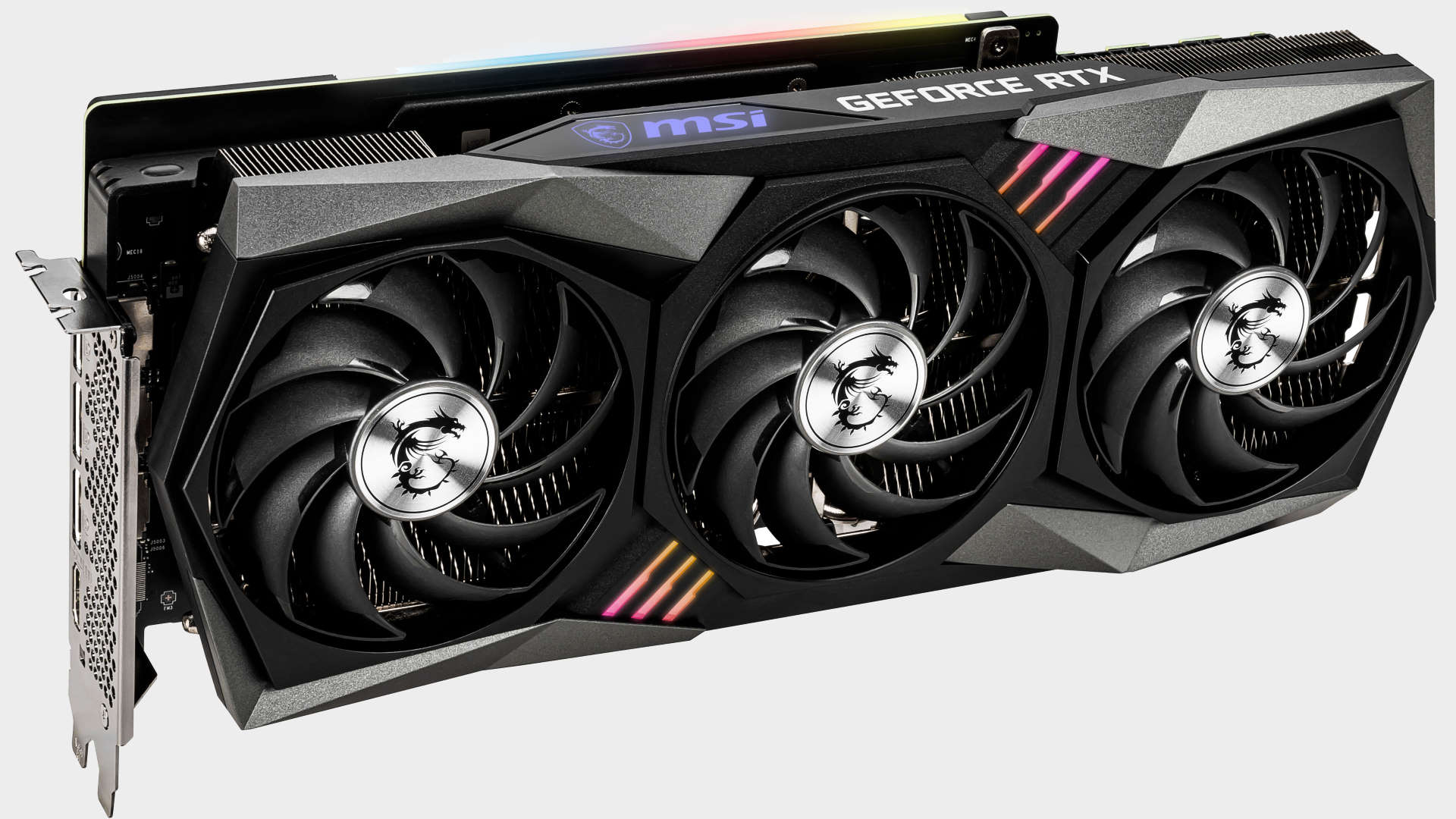
The RTX 3080, while an awesome gaming card, is not perfect, and the reason for that—and this goes for all RTX 3080 cards—is the high power consumption. 350-400W is at the upper bound of what should be considered acceptable for a graphics card. Where do you go from here? 500W? Four 8-pin power connectors? Five slots? We’re not there yet, and let’s hope we never go there. MSI tames the Ampere GPU beast though, and for that it deserves credit.
Nvidia's RTX 3080’s are also relatively awesome value. At $760 it’s one of the pricier 3080’s but compared to the outgoing 2080 Ti, it’s an absolute bargain. MSI enjoys a strong reputation for producing excellent graphics cards, and this is yet another. Now, about that Lightning overclocked version…
MSI's RTX 3080 Gaming X Trio is cooler, quieter and faster than the Founders Edition. This one is a genuine contender.

Chris' gaming experiences go back to the mid-nineties when he conned his parents into buying an 'educational PC' that was conveniently overpowered to play Doom and Tie Fighter. He developed a love of extreme overclocking that destroyed his savings despite the cheaper hardware on offer via his job at a PC store. To afford more LN2 he began moonlighting as a reviewer for VR-Zone before jumping the fence to work for MSI Australia. Since then, he's gone back to journalism, enthusiastically reviewing the latest and greatest components for PC & Tech Authority, PC Powerplay and currently Australian Personal Computer magazine and PC Gamer. Chris still puts far too many hours into Borderlands 3, always striving to become a more efficient killer.
